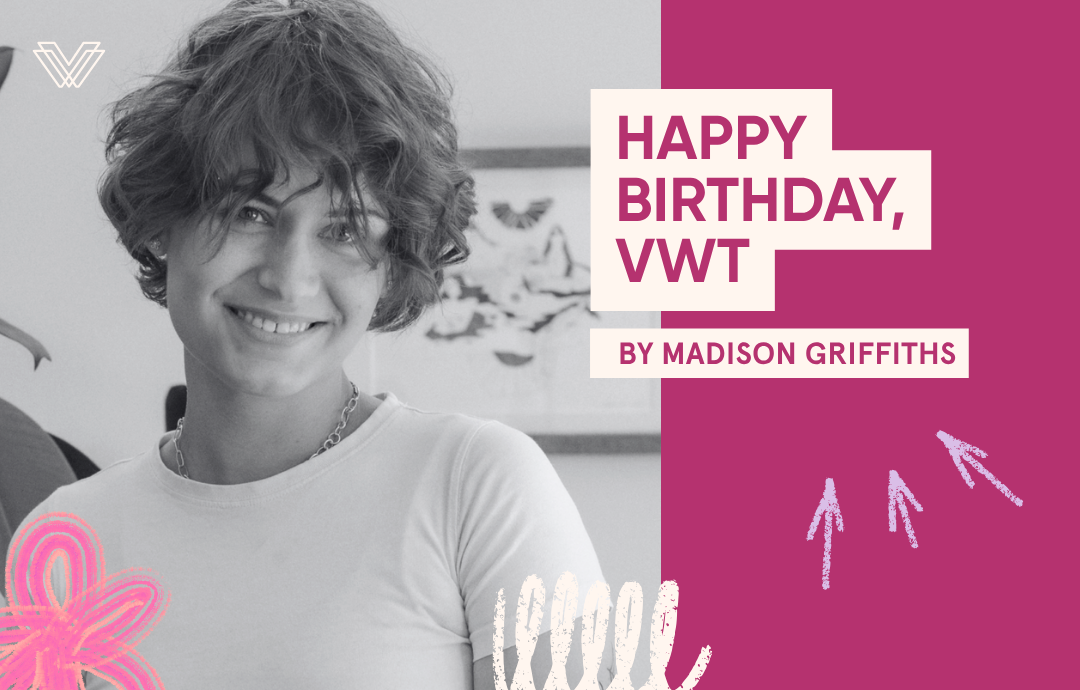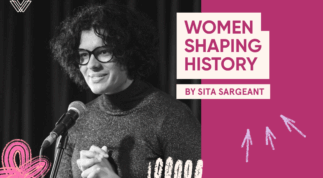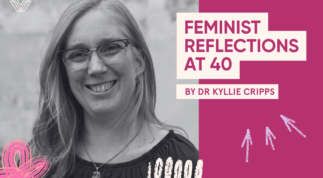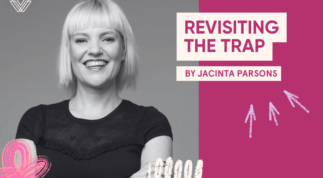While unpacking my car, I noticed it. A sage-coloured, A4 chronicle tucked neatly into a seatback pocket. I had received it some years ago in the post from the Victorian Women’s Trust: an enduring collection of printed out feminist musings, demands and concerns, as plucked from Trust-exclusive archives.
I recall it boasting transcriptions of impassioned discussions likely conducted in university women’s lounges throughout the 1980s. I didn’t remove it from my car, instead relishing the thought of its company. It was to join me as I embarked on a big, interstate move.
This is reminiscent, of course, of the Trust’s own legacy in my adult life. From 23-years-old, I have been encouraged, consulted, supported and championed by the Trust. As I’ve clambered through my career, carved homes out of different lodgings in different suburbs and — now, states — refined my feminism, and been ushered into the folds of pregnancy and motherhood, the Trust has remained a mighty and encouraging force.
Many a feminist organisation — such as the Trust — have weathered the brunt of political tyranny over the last five years. In fact, not often do they reach such a 40-year milestone.
In the United States alone, abortion has been re-criminalised in much of the country, ‘Diversity, Equity and Inclusion’ (DEI) programmes have gone belly up, and the world-at-large has felt the eerie rumble of fascism and sexism as a result. A recent survey by UN Women has made patent the global tenuousness of women-led organisations, with it estimating that nearly half of those that support crisis-affected populations risk ceasing operations within six months due to a lack of resources.
But still, the Trust remains: bunkering down in its efforts to fund, promote and sponsor women-led initiatives that share its undying ethos.
Since 1985, the Trust has managed to afford approximately $8.6 million in over 730 grants to women across Victoria. In 2021, the Trust was an eager patron of ‘Tender: Roia Atmar’, an audio-documentary I co-produced with Beth Atkinson-Quinton that followed the journey of a victim-survivor as she embarked upon leaving abusive relationships. With the Trust’s support, we were able to tell an urgent story, and tell it well. That same year, the Trust released ‘The Trap’, a 10-part podcast series hosted by influential journalist and author Jess Hill, whose ground-breaking recognition of ‘coercive control’ (a dedicated handful of umbrella tactics when it comes to perpetrating domestic abuse) has expanded our national understanding of gendered violence. At once, ‘The Trap’ made it easy — and accessible — to make sense of the domestic terrorism many women across the country are routinely faced with.
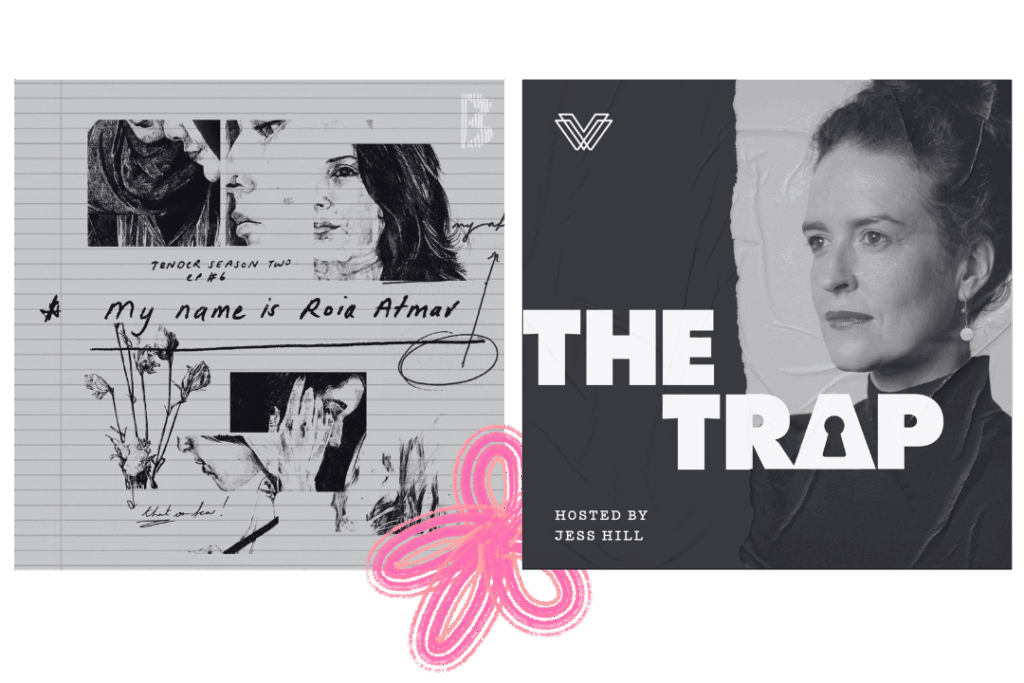
Image left: Promotional tile for season two of the podcast Tender. Image right: Promotional tile for the podcast The Trap.
As the Trust enters its fourth decade, it possesses the reflective edge of a woman unruffled and sure-of-herself, who has long retired from girlhood — and its many foibles — but who looks affectionately toward teenagers with tender eyes. I doubt the Trust would’ve made it this far if it hadn’t thought to mobilise its youngest comrades, as celebrated in the recently revamped ‘Rosie’, an online feminist youth space that allows young feminists to ask questions, seek answers and feel empowered.
Rosie pierces through the noise of a bubbling, benevolent sexism that can be found online, where young women are being influenced to embrace traditional gender-roles and discover their inner ‘trad-wife.’
Psychology lecturer Linda Peach was able to identify this transgression in her study of two different cohorts of young women over a 14-year period. In 2010, she discovered that 57% of women disagreed with conventional gender roles, whereas in 2024, only 43% did. Without initiatives like ‘Rosie’, young women are left to curb the cloak-and-dagger messaging of a sexist world without even a blink.
If one were to scour through the archives of the Trust journal, the Victorian Women’s Trust’s open-access digital periodical, the first page alone boasts articles on a wide array of topics. It encourages its readers to consider the sanctity of a Treaty, the rise of deepfakes, the proliferation of the manosphere and whether or not maternity care standards are up to par across the country.
The Trust knows an educated woman is a woman empowered, and it delights in being able to offer the public free and comprehensive feminist literacy.
In June 2025, the Trust appointed Dr Kirsten Abernethy as its new Executive Director, a social scientist, researcher and advocate who will inevitably expand the Trust’s mission: to champion contemporary feminist thought.
I have linked arms with the Victorian Women’s Trust for close to a decade now, and have felt ushered into the birth of many a feminist development alongside it, including #MeToo, the launch of AFLW, the repealing of the Tampon Tax, the decriminalisation of abortion in many states, the #LetHerSpeak campaign, the launch of Australia’s first Gender Equality Bill and more. These events sometimes feel few and far between, and I wouldn’t necessarily be able to recount each of them on the top of my head, but the Trust ensures I don’t forget them. On their website, they boast a timeline of some of Australia’s most notable gender equality milestones, making sure our history is easily deferred to as we enter a somewhat formidable era when it comes to democratic threats against social policy.
Perhaps, that’s the beauty of aging: you can cherish the wins, rise to the losses and read up on the rest.
I am sure, by the time I reach 40, I will find lodged in the seatback pocket of my own life a small, single relic from the Trust, in much the same way I have done before. There it will be: proof of the Trust’s long-standing advocacy in my own journey, but in the journey of others as well. And I hope — by then — the Trust will have steadily entered its fifties, with few aches, tremendous insight and many a bone to pick. There is too much at stake otherwise.
 Madison Griffiths is an author, artist and producer. Her debut book Tissue (Ultimo Press) was released in 2023, and is a boldly poetic meditation on abortion and what it has the power to represent. She is the co-producer of Tender, a podcast that tracks the journey of individuals as they decide to leave an abusive relationship. In 2022, she was awarded the Walkley Foundation Our Watch Award for Excellence in Reporting on Violence Against Women, alongside co-producer, Beth Atkinson-Quinton. Her second book, Sweet Nothings (Ultimo Press) was published in 2025, and interrogates how class and gender are expressed and exploited in our academic institutions.
Madison Griffiths is an author, artist and producer. Her debut book Tissue (Ultimo Press) was released in 2023, and is a boldly poetic meditation on abortion and what it has the power to represent. She is the co-producer of Tender, a podcast that tracks the journey of individuals as they decide to leave an abusive relationship. In 2022, she was awarded the Walkley Foundation Our Watch Award for Excellence in Reporting on Violence Against Women, alongside co-producer, Beth Atkinson-Quinton. Her second book, Sweet Nothings (Ultimo Press) was published in 2025, and interrogates how class and gender are expressed and exploited in our academic institutions.
